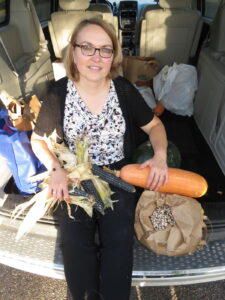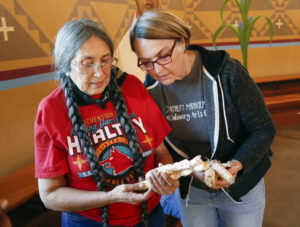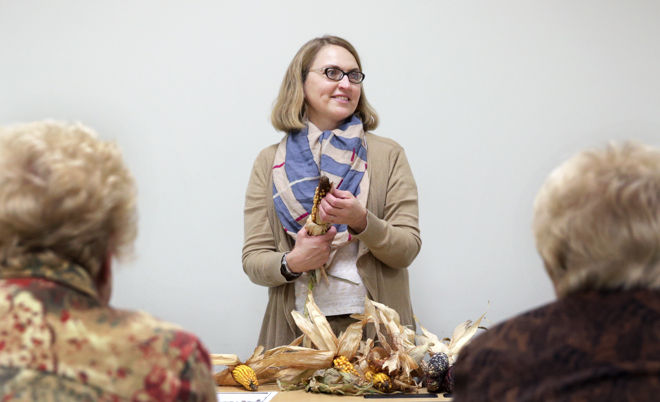Introducing Our Saint Kateri Indigenous Peoples Program

By Ronnie O’Brien
I grew up on a corn farm and had no intention of growing corn again. My mom was an avid gardener and I loved to garden too, but the thought of growing corn never once entered my mind after leaving the farm. I felt no connection to the fields of corn that we worked hard to keep irrigated all summer, carrying heavy irrigation pipes almost daily, even during the middle of the night during drought years. I never grew corn after I was married and gardened for my family, not even sweetcorn.
The corn that I knew when I grew up was harvested and sold for income, never eaten. There was a disconnect between me and corn. I had no personal feelings toward it unless irritation is a feeling. That would all change when I met Deb Echo-Hawk of the Pawnee Nation.

In 2003, at the age of 41, I was the Director of Education at a historical attraction near Kearney, Nebraska. I desired to create a school program for Nebraska 4th graders about the Pawnee Nation, as we were in the heart of their homeland. Reading about the Pawnee and the many crops that they grew in Nebraska, I came to understand that corn was very sacred to the tribe. I decided that I could grow corn again, a garden of Pawnee corn, to teach elementary students how Pawnee women planted their fields of corn: in hills, a person’s footstep apart from each other in no particular direction, five seeds to a hill, the seeds planted in the sacred semi-cardinal directions of the tribe. Wow! I began to see corn in a whole new way, although difficult for me to do.
As a Catholic, the word sacred has deep meaning to me, and I could tell through the books I was reading that the word sacred had that same deep meaning to the Pawnee people. Partly because I wanted to teach about the Pawnee and partly because I was intrigued by a people who had a relationship with corn and nature on a deep level, a sacred level that I never had, I felt called to understand this type of relationship.
When I called the Pawnee Nation in Oklahoma, where the tribe was moved in the 1870s by the U.S. Government, they had no idea who to have me talk to about corn or gardening so they put me through to their Director of Education, Deb Echo-Hawk. During our first conversation, I came to learn from Deb that their varieties of corn were almost completely extinct because they did not grow well in the hard clay and climate of north central Oklahoma. All she knew of at that time were two varieties. There was only a mayonnaise jar of seeds left from one variety and a handful of seeds from the other. To my surprise, she asked if I would be willing to try and save the seeds from extinction by growing them back in their homeland of Nebraska, if she could get permission from the Pawnee Cultural Committee.

Jump forward to 2020: Deb Echo-Hawk and I have been working side-by-side (actually, me in their Nebraska homeland and Deb in Oklahoma) to return the sacred varieties of corn to the Pawnee. We have the seeds grown in their homeland of Nebraska by volunteer gardeners who grow specifically for the tribe, keeping no seeds for themselves. Most of the varieties have returned!
Today, the volunteer gardeners in Nebraska have helped us revive 16 varieties of corn for the Pawnee through the project that has been named the Pawnee Seed Preservation Project (see us on Facebook). It has required a lot of patience, as we slowly earned the trust of the Pawnee people over time. The Pawnee have not only been able to reintroduce their sacred corn to their ceremonies and diets, we have also grown a wonderful friendship between the tribe and the gardeners, as well as with other Nebraskans who have helped us along the way.
A year ago, my love for conserving nature, thanks to the Pawnee people and the corn project, and my love for Saint Kateri led me to the Saint Kateri Conservation Center. I am thrilled to be the volunteer Coordinator of Indigenous Programs for the Center. Through the Kateri Center, we desire to serve as allies with other tribes to revive their traditional crops in their traditional homelands. Like the Pawnee, many tribes in the U.S. were forcefully removed from their homelands where their crops adapted to the soil and climate over hundreds or thousands of years. The question for us now is how do we find lands to help tribes? We have to look no further than our Catholic faith.

All Catholic institutions and individuals who own land in the U.S. do so within the traditional homelands of Native American tribes and nations, whether a few acres or hundreds. Through our Saint Kateri Indigenous Peoples Program, the Kateri Center is working to connect Catholic landowners with Native American tribes and nations to return their traditional crops to full strength, and to rebuild the relationships between tribes and the sacred soil of their homelands. It is our hope that the revival of Pawnee sacred corn can serve as a model for other Catholic landowners to connect with Indigenous tribes through growing and gathering of traditional crops. Currently, we are in the connection-building phase of this new program; we are asking Catholic individuals and institutions, such as religious orders, to contact us if they are interested in learning about the tribe that lived in their area and the crops they grew. We hope we can use our experience to build relationships with the tribes in these areas – tribes that would benefit from the return of their seeds to full strength and the renewed connections with their homelands and traditions.
Our Saint Kateri Indigenous Peoples Program relies on the generous support of individual Catholics and Catholic landowners.

I love how you helped the Pawnees get their precious corn back. It sounds as if you care about nature and the land as I do. I grew up in the country. Outside was my playground.
Bless you, Betty!